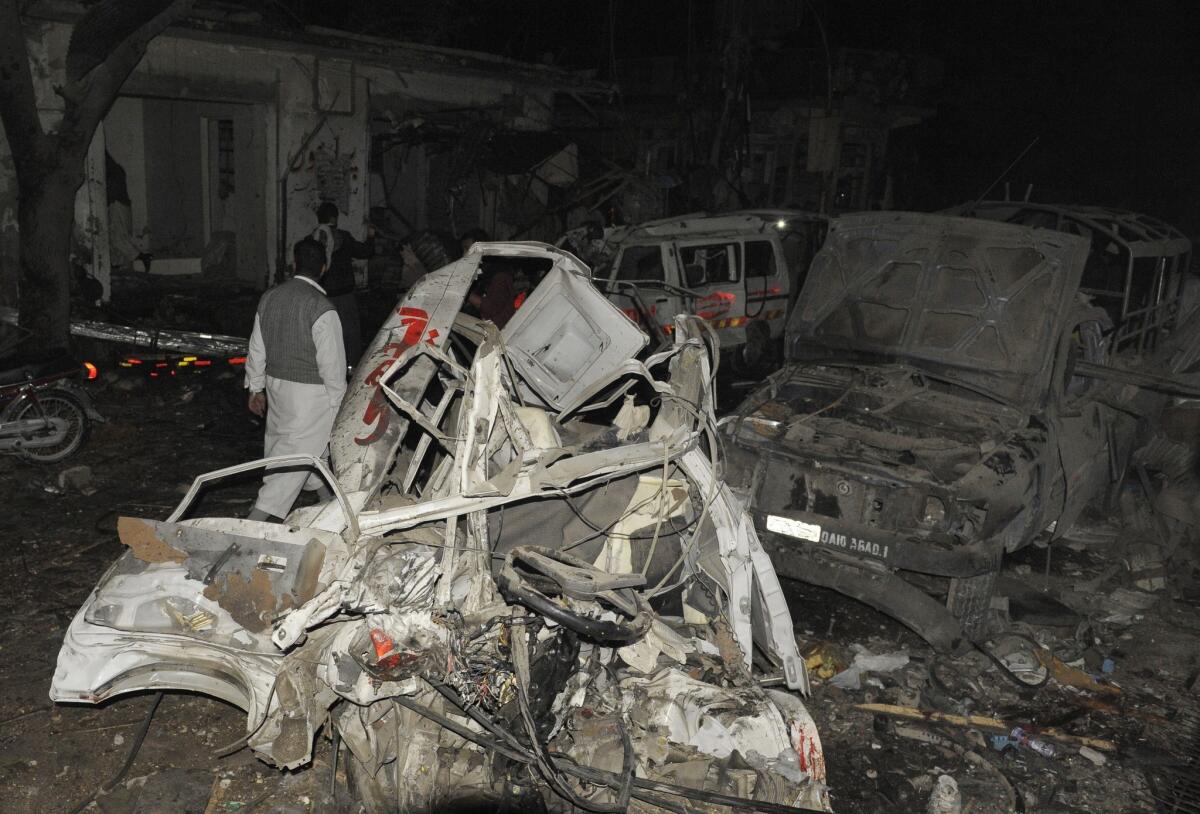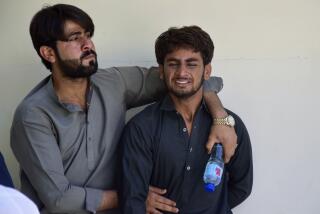Bomb blasts across Pakistan kill 104 people

- Share via
ISLAMABAD, Pakistan — In one of the deadliest days in Pakistan in recent years, a series of bomb blasts rocked the southwest city of Quetta and the country’s northwest Thursday, killing at least 104 people and injuring more than 245 others.
Two of the blasts occurred within minutes apart at a billiards hall, local authorities said. A suicide bomber walked into the building and detonated his explosives, police said, while the second blast was the result of a car bomb detonated outside as rescue teams and television crews arrived. The attack killed at least 70 people and wounded more than 160 others.
Most of the casualties were caused by the second explosion, which razed the three-story building. Among the dead was a television cameraman and several first responders. It wasn’t known whether that blast was also detonated by a suicide bomber or by remote control.
Earlier in the day, at least 12 people were killed when a roadside bomb exploded at a crowded market where several police vehicles were parked, said Quetta police chief Mir Zubair. More than 25 people were injured in that attack.
Quetta, home to nearly 900,000 people and the capital of Baluchistan province, has long been used as sanctuary by Islamic militant groups, including top Afghan Taliban leaders waging an 11-year war against Afghan and international security forces in neighboring Afghanistan. It also has been the scene of sectarian violence carried out by Sunni militant groups against minority Shiite Muslims, as well as attacks by Baluch separatists against police and government officials.
It wasn’t clear late Thursday whether the billiards hall was a location frequented by Shiites. But Pakistani media reported that Baluchistan’s Hazara community, an ethnic group comprised mostly of Shiites, had declared a three-day mourning period as a result of the killings.
Ali Dayan Hasan, Pakistan director for the New York-based Human Rights Watch, called upon Pakistani authorities to do more to ensure the security of Shiites victimized by sectarian violence.
“Pakistan’s tolerance for religious extremists is not just destroying lives and alienating entire communities, it is destroying Pakistani society across the board,” Hasan said in a statement released late Thursday. “Sectarian violence won’t end until those responsible are brought to justice.”
Prime Minister Raja Pervez Ashraf condemned the violence in Quetta, saying “such cowardly acts will not deter the government from fighting the menace of terrorism.”
No group had claimed responsibility for the attacks as of late Thursday evening.
Elsewhere in Pakistan, police were investigating a large explosion that tore through a religious center in the Swat Valley city of Mingora, killing at least 22 people and injuring 60 others.
Authorities at first thought that a gas cylinder used in cooking had exploded but later said the blast was caused by a bomb planted in the building. A large group of people had gathered for Thursday night prayers when the explosion occurred, local police said. Taliban insurgents had control over the Swat region before a Pakistani military offensive retook the region in 2009.
Also, a drone strike believed to have been carried out by U.S. forces killed five suspected militants in North Waziristan, a tribal area along the Afghan border that serves as sanctuary for Afghan and Pakistani Taliban militants and Al Qaeda fighters, according to local officials.
The missile strike was the seventh in the last two weeks. On Jan. 2, one of those strikes killed Maulvi Nazir, a top Pakistani militant commander responsible for engineering attacks on U.S. and NATO forces in Afghanistan.
ALSO:
Three female Kurdish activists slain in Paris
Freed Iranian hostages rejoin families after months in Syria
Senior Scotland Yard detective found guilty of misconduct
Special correspondent Zulfiqar Ali in Peshawar, Pakistan contributed to this report.
More to Read
Sign up for Essential California
The most important California stories and recommendations in your inbox every morning.
You may occasionally receive promotional content from the Los Angeles Times.










